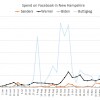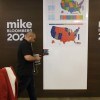Analysis | The Technology 202: 2020 Democrats get personal in Facebook ads ahead of New Hampshire primary – The Washington Post

Pete Buttigieg and Bernie Sanders shake hands onstage Friday before the start of the Democratic presidential primary debate at Saint Anselm College in Manchester, N.H. (Charles Krupa/AP)
Ctrl + N
Democrats leading in the race for the White House are increasingly calling out their rivals in Facebook ads aimed at driving last-minute donations as voters prepare to cast ballots in today’s New Hampshire primary.
Tensions are coming to a head between former South Bend, Ind., mayor Pete Buttigieg and Sen. Bernie Sanders (I-Vt.) as the pair face off following their close finish in the Iowa caucuses.
Sanders, who is the favorite to win the Granite State, made an 11th-hour pitch for donations ahead of the primary, warning supporters in ads running yesterday and today that he needed their help to take on super PACs backing Buttigieg and former vice president Joe Biden. The Sanders ad and others like it were viewed by Facebook users in states across the country. Sanders spent $458,807 on political Facebook ads between Feb. 3 and Feb. 9, according to the company’s Ad Library tracking candidate spending.

Source: Facebook Ad Library
Buttigieg, who slightly edged out Sanders in the Iowa caucuses per the latest projections, was running an ad accusing dark-money groups supporting Sanders of spending hundreds of thousands of dollars attacking his campaign. He called for donations to bolster his fight against Sanders. He spent $421,888 during the same week in February, per the Facebook Ad Library data.

The increasingly personal ads mirror the infighting among Democrats following the razor-close finish in Iowa. And they reflect how the 2020 race will play out in the digital world on sites like Facebook, Instagram and Google, where highly targeted ads sometimes aimed at small slices of voters can have big influence on donors and voters.
The companies have made significant changes to the powerful ad tools after they were abused by Russian trolls to spread inaccuracies about Hillary Clinton during the 2016 election. But many critics do not think the companies have done enough to fact-check U.S. politicians.
Facebook is a particular concern of observers as it allows micro-targeting of voters in such a way that it is difficult to track ads and to whom they’re directed, despite an Ad Library that tracks spending by candidates.
In the runup to New Hampshire, Sanders made a big push on the site, spending $50,671.44 on ads on the site in the week ending on Feb. 1, according to a data analysis by Bully Pulpit Interactive, a Democratic digital firm. Buttigieg by comparison spent $10,646.23 on Facebook ads over the same time period.
Democratic candidates’ spending on Facebook ads in New Hampshire since March 2019

Source: Bully Pulpit Interactive
The leading candidates have largely focused their ads in the Granite State on how they can beat President Trump in November, according to an analysis by Acronym, a liberal digital campaign firm backed by major Silicon Valley and Wall Street donors. (The firm was at the center of the controversy over the app issues in Iowa, though Acronym sought to distance itself from the failed Shadow app and said it had no role in the disruptions).
Sanders has had a variety of messages on New Hampshire, including ads promoting his promise to protect Social Security. Others ads have gone broader, decrying money in politics.
“They all drive home his campaign’s populist drumbeat of working together to defeat Donald Trump and everything he represents,” Acronym wrote in its analysis.
Meanwhile, Buttigieg has sought to play up his local support in the state, including videos featuring New Hampshire supporters. He’s also touting his endorsement from Rep. Annie Kuster (D-N.H.).

Sen. Elizabeth Warren’s (D-Mass.) New Hampshire ads are mostly either direct fundraising appeals or focused on promoting her work with President Obama to create the Consumer Financial Protection Bureau. Biden meanwhile has been running ads in New Hampshire (as well throughout the country) trying to fundraise off the notion that he might lose to Sanders without more donations.
Here’s an ad spotted by my colleague Anu Narayanswamy:

As the Democrats spend heavily on digital ads in New Hampshire, they’re competing with Michael Bloomberg’s extensive digital campaign. He’s not on the ballot in New Hampshire, but he’s expected to heavily spend on both TV and digital ads ahead of Super Tuesday.
BITS, NIBBLES AND BYTES

The Sprint and T-Mobile logos. (Jeenah Moon/Bloomberg News)
BITS: A federal judge green lit the $26 billion Sprint and T-Mobile merger this morning, my colleague Taylor Telford writes. The decision creates the country’s third largest wireless carrier amid a race to expand ultrafast 5G service.
“T-Mobile and Sprint, the nation’s third- and fourth-largest carriers, have argued for years that the deal would shield them from the industry’s brutal pricing wars and expedite their ability to deliver 5G to the masses,” Taylor writes.
But critics have warned the deal could limit competition and result in price-gouging that could disproportionately affect low-income customers. The Federal Communications Commission and the Justice Department okayed the deal last year, but state attorneys general led by California and New York sued to stop the merger. The attorneys general argued combining the country’s third- and fourth-largest carriers would incentivize them to raise prices.
The deal is sure roil some consumer advocates who have warned against the merger. Many were already criticizing the possibility last night as the Wall Street Journal reported the judge was expected to rule in the companies’ favor.
Reports of the merger are “nothing but bad news for people already paying too much for essential communications services,” said Matt Wood, vice president of policy and general counsel at Free Press, a nonpartisan organization supporting people’s rights to connect and communicate, last night.

The logo for Amazon Web Services Inc. (Gabby Jones/Bloomberg News)
NIBBLES: Amazon Web Services wants to depose President Trump and Defense Secretary Mark T. Esper for its high-stakes protest of the Pentagon’s $10 billion cloud computing contract award to Microsoft, my colleagues Aaron Gregg and Jay Green report. The request escalates tensions between the White House and Amazon, which contends Trump’s highly public animus toward the company influenced Pentagon officials who awarded the contract.
“The preservation of public confidence in the nation’s procurement process requires discovery and supplementation of the administrative record, particularly in light of President Trump’s order to ‘screw Amazon,’ ” Amazon Web Services spokesman Drew Herdener said in a statement Monday. “The question is whether the President of the United States should be allowed to use the budget of the [Department of Defense] to pursue his own personal and political ends.”
(Amazon chief executive Jeff Bezos owns The Washington Post).
Amazon said in a federal court claim it wants to question Trump on any communications he’s had with Microsoft and Oracle, which fought the Pentagon and Amazon in court for allegedly tainting the contract in Amazon’s favor. Trump requested Esper review the award process in the summer, citing complaints from Amazon’s competitors. Esper recused himself just three days before the contract was awarded.
Microsoft declined to comment on Amazon’s motion and referred to a previous statement spokeswoman Janelle Poole issued on the JEDI contract. “ We have confidence in the qualified staff at the Department of Defense, and we believe the facts will show they ran a detailed, thorough and fair process in determining the needs of the warfighter were best met by Microsoft,” Poole’s statement said.

President Trump. (Chris Kleponis/CNP/Bloomberg News)
BYTES: The White House wants a big increase in artificial intelligence research, according to a 2021 budget it proposed yesterday. The proposal would grant more than $850 million for nondefense AI research, a more than 70 percent increase over the 2020 budget.
“It’s imperative that the U.S. continues to lead in technologies like AI,” U.S. Chief Technology Officer Michael Kratsios told reporters. “We see others using artificial intelligence to track their people, to imprison ethnic minorities — this is something that does not align with American values.”
Yet the budget, which Congress is unlikely to adopt, still trails behind spending by China on AI.
The budget also calls to increase investment in military artificial intelligence research by more than $100 million, including increased investments in the controversial Pentagon initiative Project Maven as it expands to other intelligence-based projects for military use.
The proposed budget would also double investments across key agencies into quantum computing, a key area of competition between the United States and China. Some of that would go toward developing the a new “quantum Internet.”
PUBLIC CLOUD
— News from the public sector:
Technology
Voting by smartphone in Seattle pushes the limits of electronic balloting
Election officials are letting voters in a little-followed race cast ballots with their mobile phones, even as critics raise concerns over the vulnerability of digital ballots.
Jay Greene
Mike Bloomberg doesn’t want Silicon Valley’s money. He does want its employees.
Bloomberg gathered hundreds of tech leaders on a call to ask for their most talented friends.
Recode
National Security
U.S. charges four Chinese military members in connection with 2017 Equifax hack
The breach gave hackers access to the personal information of nearly half of all Americans.
Devlin Barrett and Matt Zapotosky
Democratic senators press Amazon over injury rates
A group of senators, including Sen. Sherrod Brown (D-Ohio) and 2020 Democratic presidential candidate Sen. Bernie Sanders (I-Vt.), pressed Amazon in a letter on Monday over the higher-than-industry-average injury rates in its U.S. warehouses, pushing the company to take “concrete actions” to ensure its facilities are as safe as possible.
The Hill
PRIVATE CLOUD
— News from the private sector:
Uber Loses Early Challenge to California Gig-Worker Law
Uber Technologies Inc. failed to persuade a judge to shield its drivers from California’s gig-worker protection law while the company challenges the landmark measure in court.
Bloomberg
Google’s head of HR to step down
Google’s top HR exec Eileen Naughton will exit later this year amid rising tensions with the company’s workers.
Fortune
ACLU Slams Facial Recognition Company That Scrapes Photos From Instagram And Facebook
”The report is absurd on many levels and further demonstrates that Clearview simply does not understand the harms of its technology in law enforcement hands.”
BuzzFeed News
#TRENDING
— Tech news generating buzz around the Web:
How Your Laptop Ruined Your Life
Smartphones aren’t the only killers of work-life balance.
The Atlantic
What Scientists Can Learn From Alien Hunters
The history of the search for extraterrestrial life is a good way to understand the unintended consequences of fence-building and boundary-setting in other disciplines.
Wired
CHECK-INS
— Today:
- The House Energy and Commerce committee will host a hearing “Autonomous Vehicles: Promises and Challenges of Evolving Automotive Technologies” at 10 a.m.
— Coming up:
- The Department of Justice will hold a public workshop in Washington, D.C. on Feb. 19, 2020, titled “Section 230 – Nurturing Innovation or Fostering Unaccountability”
- Mobile World Congress takes place Feb. 24 to 27 in Barcelona.















